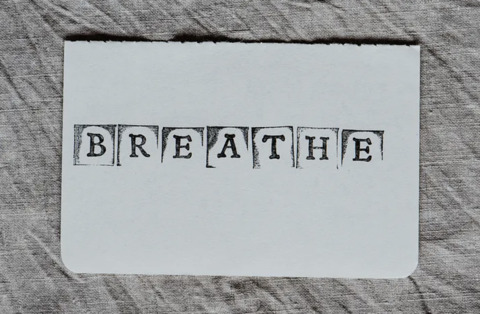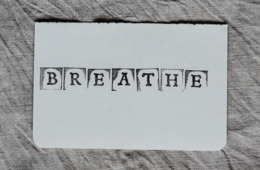
- Find a comfortable position. You can be sitting or standing tall but relaxed.
- Close your eyes if it feels natural, and take a slow, steady breath in through your nose.
- Exhale gently through your mouth, noticing the air as it leaves your body.
- Focus on the physical sensations of breathing—the rise and fall of your chest, the cool air entering your nose.
- If your mind wanders (and it will), gently bring it back to your breath without judgment.
Breathing is Science
Breathing is one of the body’s most fascinating functions, it happens automatically, yet we can consciously control it. When you take slow, deliberate breaths, you activate the parasympathetic nervous system, also known as the “rest and digest” response. This signals your body to slow down, reducing your heart rate, lowering blood pressure and cortisol levels, (the stress hormone.) So basically, mindful breathing teaches your body how to relax on command, even when your mind is in overdrive.
How Mindful Breathing Reduces Stress
Stress thrives when your thoughts are stuck in the past or racing toward the future. Mindful breathing pulls you out of that mental chaos and anchors you in the present moment. As you focus on each inhale and exhale, you shift attention away from anxious thoughts and into the rhythm of your breath. This simple act of mindful breathing quiets mental chatter, reduces anxiety, and creates a sense of calm. With consistent practice, you’ll find yourself responding to stress with more control and less reactivity.
Emotional Benefits of Mindful Breathing
Mindful breathing does more than just calm your nerves, it helps you understand your emotions. When you pay attention to your breathing, you start noticing how different feelings like anger, tension, or sadness show up in your body. Instead of automatically reacting, you learn to pause and breathe through them. Over time, this practice cultivates patience, emotional awareness, and a healthier mindset. Many people report feeling more compassionate, both toward themselves and others, after just a few weeks of regular practice.
So Simple, All You Need is Your Lungs
You don’t need anything special, like candles, mantras, or a meditation app to start. Just a few quiet minutes and a willingness to focus are enough. Try this:
Start with two or three minutes a day and build from there. The goal isn’t perfection, just consistency.
How to Incorporate Mindful Breathing Into Daily Life
The best part about mindful breathing is how easily it fits into your daily life. You can use it anywhere, while waiting in traffic, before a meeting, or anytime you feel irritation creeping in. Taking just a few deep breaths before responding to a stressful email or during a tense conversation can change how you handle the moment. These small pauses add up, training your mind to stay centered even when life feels messy.
Using Breathing to Help With Sleep
If you struggle with racing thoughts while trying to sleep, mindful breathing can help quiet your brain. Deep, rhythmic breathing tells your body that you are safe and can relax which can help ease the transition into sleep. Try inhaling through your nose for a count of four, holding briefly, and exhaling for a count of four. This pattern calms the nervous system and slows your thoughts, helping you drift off naturally without forcing it.
The Mind-Body Connection
Regular mindful breathing helps build awareness between how you feel and how your body reacts. You’ll start to notice that when you’re anxious, your breath becomes shallow. When you intentionally slow it down, your body and emotions follow. This awareness gives you more control over how you react to stress, helping you move through difficult moments with greater resilience and balance.
The Benefits of Consistency
Like any healthy habit, mindful breathing takes practice. Set small reminders during your day. A few deep breaths before you open your phone in the morning, or a minute of stillness before bed make a big difference. Pairing your breathing practice with daily routines makes it easier to remember and integrate into your life. With consistency it will eventually become automatic, giving you a tool for calm anytime you need it.
Mindful Breathing FAQ
1. How long should I practice mindful breathing each day?
Even two to five minutes can make a noticeable difference. As you get comfortable, you can gradually increase your practice to 10–15 minutes a day.
2. Can I practice mindful breathing while doing other things?
Absolutely. You can breathe mindfully while walking, cooking, or waiting in line. The goal is to bring awareness to your breath, no matter what you’re doing.
3. What if I can’t stop my mind from wandering?
That’s completely normal. The point isn’t to empty your mind, it’s to gently bring your focus back to your breath whenever it wanders. Every return to awareness strengthens the practice.
4. Does mindful breathing really help with anxiety?
Yes. By slowing your breath and activating your body’s relaxation response, you can calm your nervous system and reduce anxiety symptoms. It’s a scientifically backed method for stress relief.
5. How soon will I notice results?
Deep breathing can calm you instantly but the more you do it the better results you will see. The key is consistency, the more you practice, the stronger the benefits become. But even if you don’t practice everyday, it will still help in stressful situations
Feeling constantly stressed, anxious, or just running on empty? You’re not alone, and luckily the fix might be more simple than you think. Mindful breathing is a small but powerful practice that can help calm your mind, reduce stress, and bring more balance into your day.
At its core, mindful breathing is about paying attention to your breath; slowing down, focusing, and letting go of distractions. It’s one of the easiest ways to quiet your thoughts and reset your nervous system. Research shows that even a few minutes of conscious breathing can lower stress hormones, improve focus, and boost emotional well-being.
In this article, we’ll look at the science behind mindful breathing, explore its benefits, and share practical ways to make it part of your daily routine so you can find calm, clarity, and a deeper sense of peace in the middle of life’s chaos.
- Find a comfortable position. You can be sitting or standing tall but relaxed.
- Close your eyes if it feels natural, and take a slow, steady breath in through your nose.
- Exhale gently through your mouth, noticing the air as it leaves your body.
- Focus on the physical sensations of breathing—the rise and fall of your chest, the cool air entering your nose.
- If your mind wanders (and it will), gently bring it back to your breath without judgment.
Breathing is Science
Breathing is one of the body’s most fascinating functions, it happens automatically, yet we can consciously control it. When you take slow, deliberate breaths, you activate the parasympathetic nervous system, also known as the “rest and digest” response. This signals your body to slow down, reducing your heart rate, lowering blood pressure and cortisol levels, (the stress hormone.) So basically, mindful breathing teaches your body how to relax on command, even when your mind is in overdrive.
How Mindful Breathing Reduces Stress
Stress thrives when your thoughts are stuck in the past or racing toward the future. Mindful breathing pulls you out of that mental chaos and anchors you in the present moment. As you focus on each inhale and exhale, you shift attention away from anxious thoughts and into the rhythm of your breath. This simple act of mindful breathing quiets mental chatter, reduces anxiety, and creates a sense of calm. With consistent practice, you’ll find yourself responding to stress with more control and less reactivity.
Emotional Benefits of Mindful Breathing
Mindful breathing does more than just calm your nerves, it helps you understand your emotions. When you pay attention to your breathing, you start noticing how different feelings like anger, tension, or sadness show up in your body. Instead of automatically reacting, you learn to pause and breathe through them. Over time, this practice cultivates patience, emotional awareness, and a healthier mindset. Many people report feeling more compassionate, both toward themselves and others, after just a few weeks of regular practice.
So Simple, All You Need is Your Lungs
You don’t need anything special, like candles, mantras, or a meditation app to start. Just a few quiet minutes and a willingness to focus are enough. Try this:
Start with two or three minutes a day and build from there. The goal isn’t perfection, just consistency.
How to Incorporate Mindful Breathing Into Daily Life
The best part about mindful breathing is how easily it fits into your daily life. You can use it anywhere, while waiting in traffic, before a meeting, or anytime you feel irritation creeping in. Taking just a few deep breaths before responding to a stressful email or during a tense conversation can change how you handle the moment. These small pauses add up, training your mind to stay centered even when life feels messy.
Using Breathing to Help With Sleep
If you struggle with racing thoughts while trying to sleep, mindful breathing can help quiet your brain. Deep, rhythmic breathing tells your body that you are safe and can relax which can help ease the transition into sleep. Try inhaling through your nose for a count of four, holding briefly, and exhaling for a count of four. This pattern calms the nervous system and slows your thoughts, helping you drift off naturally without forcing it.
The Mind-Body Connection
Regular mindful breathing helps build awareness between how you feel and how your body reacts. You’ll start to notice that when you’re anxious, your breath becomes shallow. When you intentionally slow it down, your body and emotions follow. This awareness gives you more control over how you react to stress, helping you move through difficult moments with greater resilience and balance.
The Benefits of Consistency
Like any healthy habit, mindful breathing takes practice. Set small reminders during your day. A few deep breaths before you open your phone in the morning, or a minute of stillness before bed make a big difference. Pairing your breathing practice with daily routines makes it easier to remember and integrate into your life. With consistency it will eventually become automatic, giving you a tool for calm anytime you need it.
Mindful Breathing FAQ
1. How long should I practice mindful breathing each day?
Even two to five minutes can make a noticeable difference. As you get comfortable, you can gradually increase your practice to 10–15 minutes a day.
2. Can I practice mindful breathing while doing other things?
Absolutely. You can breathe mindfully while walking, cooking, or waiting in line. The goal is to bring awareness to your breath, no matter what you’re doing.
3. What if I can’t stop my mind from wandering?
That’s completely normal. The point isn’t to empty your mind, it’s to gently bring your focus back to your breath whenever it wanders. Every return to awareness strengthens the practice.
4. Does mindful breathing really help with anxiety?
Yes. By slowing your breath and activating your body’s relaxation response, you can calm your nervous system and reduce anxiety symptoms. It’s a scientifically backed method for stress relief.
5. How soon will I notice results?
Deep breathing can calm you instantly but the more you do it the better results you will see. The key is consistency, the more you practice, the stronger the benefits become. But even if you don’t practice everyday, it will still help in stressful situations

Breathe Deeply, Live Peacefully
Mindful breathing is one of the simplest yet most powerful ways to manage stress and restore balance. It costs nothing, requires no special setup, and can be done anytime and anywhere. Just a few intentional breaths can change your state of mind, helping you find clarity and peace even in the middle of chaos. The next time life feels overwhelming, take a deep breath and remind yourself that calm is only a few deep breaths away.
Related posts




